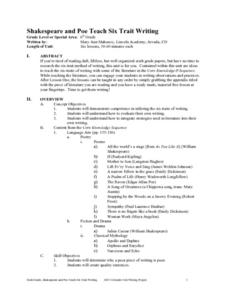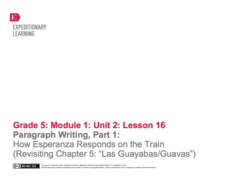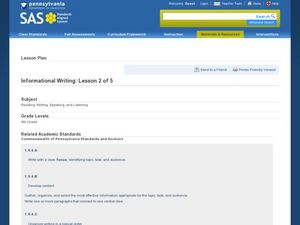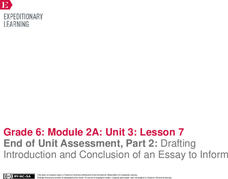EngageNY
Our Group Readers Theater: Revision, Conclusion, and First Rehearsal
Revision is the key to great writing. Individuals revise their readers theater scripts and write a group conclusion. Scholars then perform their scripts for another group and receive feedback.
Curated OER
Persuasive Writing I
Examine the characteristics of an effective persuasive paper. In a group, eighth graders discuss the analogy of a debate being like a persuasive paper. After brainstorming topics, they write an argument and then debate it. Secretly, the...
Curated OER
The "Write" Stuff: Strategies and Conventions for Imaginative Writing
A comprehensive and immersive series of lessons that examines various aspects of story development leads learners into writing a narrative of their own. Writers develop an understanding of the writing process as they use the learning...
Curated OER
Shakespeare and Poe Teach Six-Trait Writing
A Six-Trait Writing instructional activity helps your middle schoolers liven up their word choice and shows them how to evaluate their own writing. Class members take a close look at the language used in poems by Shakespeare, Kipling,...
Curated OER
Persuasive Essay Writing: The Real Story
How can you get others to agree with your point of view? This packet focuses on employing persuasive strategies and how to write descriptively. There's a writing sample provided, and a great graphic organizer. Use these tools to help...
Curated OER
Expository Writing (Informational Brochure)
Design an informational brochure to urge people to move to a specific community. The purpose of this activity is to expose pupils to expository writing. After creating the brochure, they write a three-paragraph persuasive or...
EngageNY
Mid-Unit Assessment: Completing My Draft Position Paper
What's the difference? Scholars analyze the similarities and differences between introductory and concluding paragraphs. Then, using a model essay as a guide, they write their draft position papers.
EngageNY
Writing: Analyzing the Conclusion of “The Golden Key” and Drafting a Compelling Conclusion for the Hero’s Journey Narrative
There's something different here. Using a note-catcher, scholars determine the differences between the conclusion of a piece of analytical writing and the conclusion of a narrative. Next, they begin drafting their own narrative...
Curated OER
Persuasive Writing-"Those Whales"
Use an article about an Orca killing a trainer to help writers complete a persuasive essay. The article, other templates, and models are attached. Scholars divide up into groups of three where each person takes a different role,...
Curated OER
Writing the Essay
Relate the structure of the essay to the structure of a building. The class compares an essay to a building, with the writer being the architect, the introduction being the foundation, and so on. They use the visual representation of a...
EngageNY
Scaffolding for Position Paper: Clarifying Body Paragraphs, Introduction, and Conclusion
All clear! Scholars read through the body paragraphs of their position papers to ensure clarity. They also review their planners to make sure all information is paraphrased without plagiarism. When satisfied with the body paragraphs,...
Curated OER
Persuasive Writing II
Help your young writers use logic in their persuasive writing. Discuss the characteristics of a persuasive paper, and have pupils work together to explore and solve a syllogism. They will write a short persuasive paper which includes a...
Curated OER
The "Write" Stuff: Strategies and Conventions for Imaginative Writing
Fifth graders develop and practice the steps involved in imaginative writing. They follow the steps/worksheets included and write imaginative stories of their own.
EngageNY
Paragraph Writing, Part II
Come up with a list of requirements for this expository essay on Esperanza's character in Esperanza Rising as a class and use the list to guide class writing. Here, learners will complete the first paragraph, discuss their notes for the...
EngageNY
Paragraph Writing, Part 1: How Esperanza Responds on the Train (Revisiting Chapter 5: "Las Guayabas/Guavas")
When your class members have completed the novel Esperanza Rising, they will be ready to write an expository essay on how Esperanza responds to events and what this says about her character. Set your pupils up for success by...
Pennsylvania Department of Education
Informational Writing: Lesson 2 of 5
Introduce expository writing to your elementary learners. Young authors write a three-paragraph informational paper using the steps of the writing process. They follow guided lessons to experience each of five steps. Included are tons of...
ReadWriteThink
Dear Librarian: Writing a Persuasive Letter
Everyone deserves to read a great book! Here, pupils write a persuasive letter to the school's librarian detailing their favorite story and why it should be found on the shelves. Class members' persuasive reading passages are shared with...
Curated OER
Stating Your Case: Writing Thesis Statements Effectively
As a writer, if you have a weak introductory paragraph or thesis statement, you might lose your audience! Have your middle and high schoolers practice writing introductory paragraphs that include clear thesis statements in response to...
Prestwick House
Writing Arguments in Response to Nonfiction
Emotional appeal or argument? That is the question. An informative lesson helps your class recognize the difference between a logical argument and an emotional appeal and learn how to craft an argumentative response. Writers develop a...
ReadWriteThink
Persuasive Essay: Environmental Issues
Young environmentalists learn how to craft a persuasive essay about an environmental issue they consider important. After studying the components of a persuasive essay and examining a student model, writers brainstorm possible topics and...
EngageNY
Drafting Introduction and Conclusion
In conclusion ... Scholars analyze the model essay Adversity Faced by Townspeople in
the Middle Ages to gain a better understanding of introductory and concluding paragraphs. After studying the author's strategies, learners begin...
EngageNY
End of Unit Assessment, Part 2: Drafting Introduction and Conclusion of an Essay to Inform
A powerful introduction and conclusion can really pack a punch. Using the resource, scholars first read and discuss a model essay. Then, as part of the end of unit assessment, they draft the introductory and concluding paragraphs of...
Syracuse University
Ancient World Writing System
Most twenty-first century pupils don't know how to interpret cuneiform. Examining images of cuneiform and papyrus writing and using a chart and Venn diagram, young historians extrapolate what life may have been like for people who lived...
Curated OER
How to Write an Essay: Secondary ed.
Whether introducing the structure of expository essays or reviewing the format with your high schoolers, take the time to check out this resource. Examples of seven common forms of introductory paragraphs and six types of conclusions, as...
Other popular searches
- Conclusion Writing
- Science Conclusion Writing
- Writing Conclusion Sentences
- Essay Writing Conclusion
- Esl Writing Conclusions
- Writing Conclusions Essay
- Writing a Conclusion 3 5
- Persuasive Essay Conclusion
- Writing Conclusion Paragraphs
- Conclusions Persuasive Essay
- \"Persuasive Essay Conclusion\























